

Staffing, Finance, and Radical Politics


The Vermont Socialist - GMDSA newsletter (9/30/25): We go up together, or we go down together
Thanks to all who attended the Labor Day rally in Burlington, one of countless major protests across the country on Sept 1. We were proud to stand side-by-side with so many unions and activist organizations demanding an end to America's oligarchy.
Vermont's labor movement is growing more powerful, unified, and assertive. Right now, in St. Albans, workers want their milk money.
They also want shorter workdays and better health and retirement plans. Last week, members of Teamsters Local 597 went on strike against their employer, the Dairy Farmers of America. The processing plant, which supplies Cabot and Ben & Jerry's, brought in scabs.
If you can, please show your solidarity with the workers, as several Green Mountain Democratic Socialists already have, by joining the 24/7 picket line at 140 Federal St., St. Albans City, VT 05478. You can even ask them about donating to their strike fund.
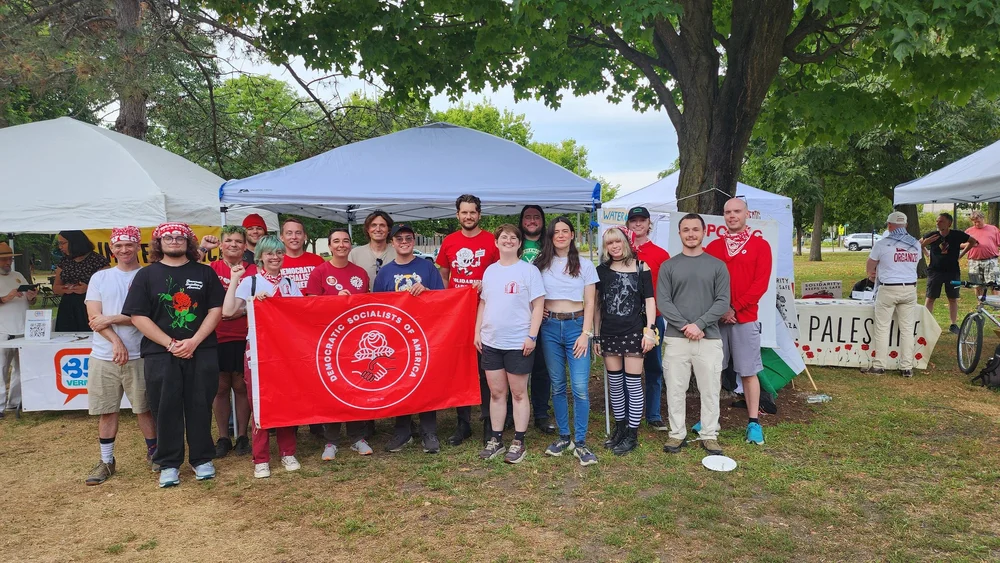
Sept. 1 in Burlington
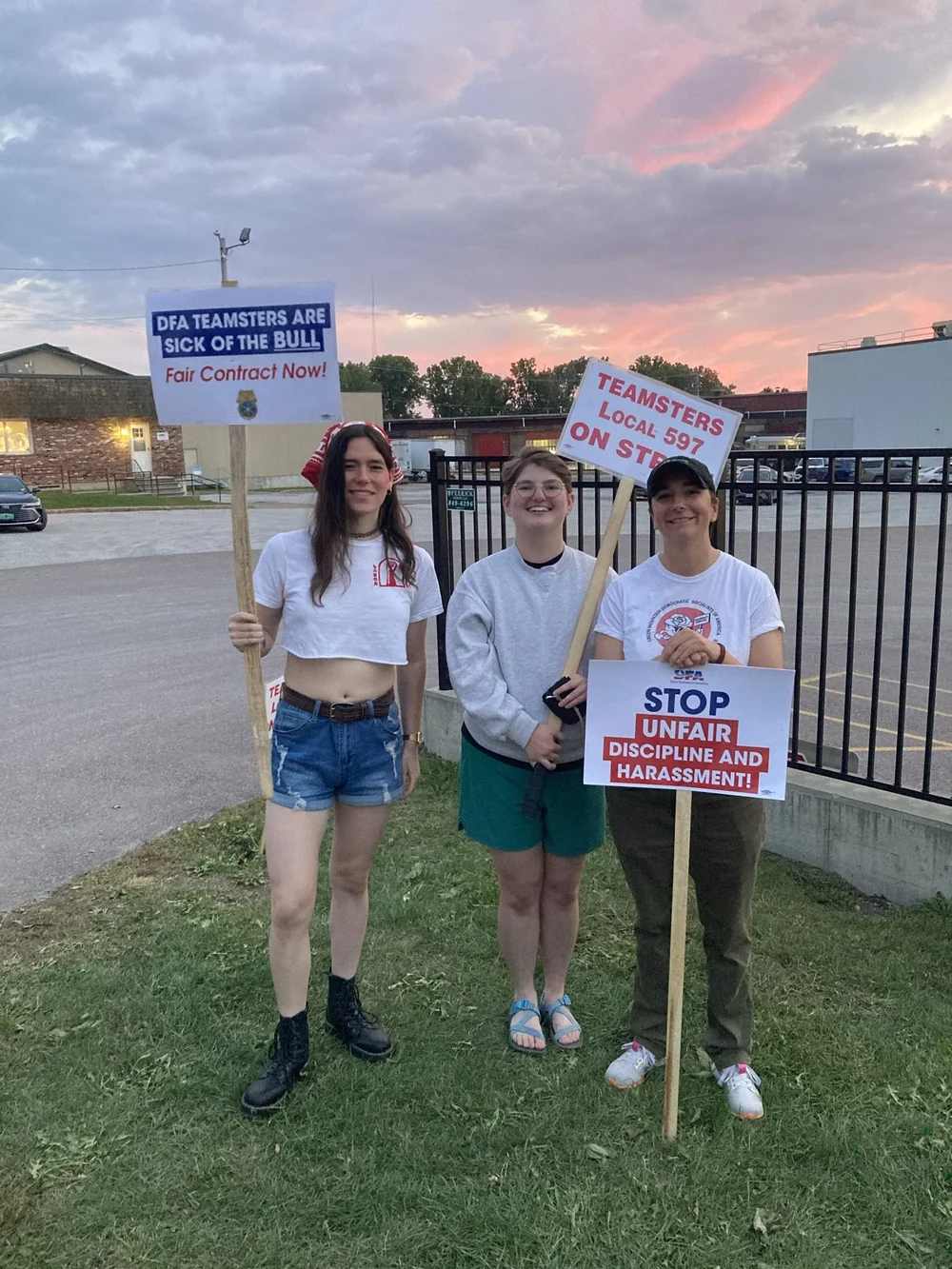
Sept. 27 in St. Albans
And if you want to help build working-class militancy across the country, join DSA. In Vermont and everywhere else, we are fighting to organize workplaces, win elections, and advance a better world for all.
With that in mind, please consider marking your calendar for our next general meeting (10/11). Details below.
GMDSA MEETINGS AND EVENTS
🚲 Our Urbanism Committee will meet on Monday, Oct. 6, at 6 p.m. on Zoom.
🔨 Talk about your job and learn about shop-floor organizing from peers at Workers' Circle (co-hosted by the Green Mountain IWW) on the second and fourth Wednesdays of each month, including Oct. 8, at 6 p.m. at Migrant Justice (179 S. Winooski Ave., Burlington).
🤝 GMDSA's East and West branches will come together for another general meeting on Saturday, Oct. 11 at 11 a.m. at Burlington's Fletcher Free Library (235 College St.), where we'll continue last month's discussion about forming a chapter-wide priority campaign for 2026. Newcomers can show up at 10 a.m. for an optional orientation.
🧑🏭 Our Labor Committee will meet on Monday, Oct. 13, at 6 p.m. on Zoom.
🗳️ The next meeting of our Electoral Committee will take place on Wednesday, Oct. 15, at 6 p.m. on Zoom.
👋 Find out how you can help our Membership Committee improve recruitment and involvement in our chapter on Wednesday, Oct. 29, at 6 p.m. on Zoom.
STATE AND LOCAL NEWS
📰 Striking school bus drivers in Windham County returned to work, subsequently ratifying a new union contract.
📰 A Burlington musician has launched a campaign to become Chittenden County sheriff on a promise to refuse to carry out unjust eviction orders.
COMMUNITY FLYERS




Against the Militarization of Portland
SIGN ON: Fight Authoritarianism with the “Full Force” of the Working Class
Organizations and unions: Sign on to this letter and add organizational info here.
As Trump continues to sow terror on the working class, we, the undersigned organizations, are committed to protecting our rights to organize freely without fear of state repression. Engaging in peaceful protest and criticism of the government and the current social order is essential to democracy and freedom.
This weekend, Trump published a draconian directive to federal agencies to surveil and disrupt individuals and organizations who exhibit supposed “indicators of violence” including “anti-Americanism”, “anti-capitalism”, “extremism on migration, race, and gender”, and “hostility towards those who hold traditional American views on family, religion, and morality”. These are obvious signals to repress anyone who criticizes corporations, ICE, Israel, transphobia, patriarchy, Christian nationalism, and anti-abortion policies.
Trump then announced on social media that he would deploy military troops to Portland and use “full force, if necessary.” Oregon is not being targeted for federal intervention because of any actual threat to safety here, but because we have a proud history of demonstrating working-class power such as in street mobilizations, labor militancy, and our recently elected left-leaning Portland City Council. The business lobby alongside both liberal and conservative politicians tried to create the perception of Portland being a crime-ridden warzone in recent years – and now even they are opposed to troop deployment here.
If Trump sends federal agents or the National Guard to Portland, it will do nothing to solve the daily crises – created by capitalism and made worse by Trump himself – that working Oregonians already face: housing insecurity, low wages, unstable employment, underfunded schools, cuts to public programs, escalating climate disasters, and corporate control of nearly every aspect of our lives.
We condemn the attempts to intimidate working class people, especially immigrants, and contrive an “emergency” to further repress our right to organize and protest.
We declare ourselves part of the century-old movement against fascism.
We pledge to protect members of our organizations, our families, our immigrant neighbors and our communities against Trump’s intimidation and violence. We pledge non-cooperation and resistance against illegal, unconstitutional violations of our human rights. We encourage all dissidents to organize at work, at school, in their neighborhoods, and in their faith communities.
We pledge to mobilize the power of our members in collective actions, as we know how:
- Withhold our labor or creatively deploy our labor
- Coordinate direct actions such as pickets, marches, rallies, vigils, and caravans
- Engage in civil disobedience such as sit-downs and sit-ins
- Display our union banners and wear our union gear at work and in public
- Display yard signs and window signs expressing our unity against fascism
- Encourage individual federal agents and National Guard troops to disobey unlawful orders
- Encourage our members and all resisters to participate in surveillance and rapid response to ICE, federal agent, and troop activity
People power is the only way to stop authoritarianism and create a better world that we all deserve.
The post Against the Militarization of Portland appeared first on Portland DSA.


The Capitalists Are Right: We Need to Work Harder
“Nobody cares, work harder.”

I watch my parents work themselves to the bone, while they are constantly exploited by the people for whom they work, and the capitalists who are oh so nice enough to afford them a place to live, while taking every opportunity to take more without reason and say, “That’s just how it works.”
My people sacrifice their bodies to erect buildings for companies that will exploit and discriminate against them. They leave their homeland, ravaged by corporations, corruption, colonialism, and imperialism, to build homes they may never be able to afford themselves.
I came across a forum post in which users were venting about their frustration, no, their hopelessness, in not being able to find a job in a system that requires you to have one to afford the most basic human necessities.
I sat back and read as many admitted they just don’t see an end in sight, and were looking at heartbreaking alternatives to ease the suffering.
But we’re told we just need to “work harder.”
“Work.” Rich, coming from those who don’t seem to understand its meaning.
“But you don’t understand, if you work hard enough, you too will one day own capital. You, too, will one day be a big shot!”
Okay, even if that were true, then what?
What happens when we’re all filthy rich CEOs? At the expense of exploiting other countries, mind you, but that’s a whole other story.
Who will perform the labor?
“You just hire others to do it for you! Better yet, you can replace them all with AI or overseas laborers and pay THEM pennies on the dollar.”
But I thought the capitalist dream was that we all become big shots?
Do you see how that’s an inherently flawed “plan?”
Our participation in this capitalist system leaves us with two options: sell our labor at a tremendous loss, monetary and quality-of-life-wise, or exploit our fellow humans.
What kind of a choice is that?
We work ourselves to death, and for what? Low wages, maybe some benefits, and to be tossed aside at any given moment while CEOs rake in the fruits of our labor.
We’re then, if lucky enough, forced into gig work, meaning even longer hours, less pay, no benefits, and still, the company giving you the wonderful privilege of “being your own boss” takes their unfair cut of your labor.
And if you manage to start your own business free of these parasitic owners, congratulations, you are now in competition with them.
Do you see how hard we’ve been working and continue to work? Do you see how easy these corporations, these capitalists have had it at YOUR expense?
You know what, maybe we do need to work harder.
We need to work harder to take back our labor.
Our time
Our dignity
Our lives.
The post The Capitalists Are Right: We Need to Work Harder first appeared on Salt Lake DSA.
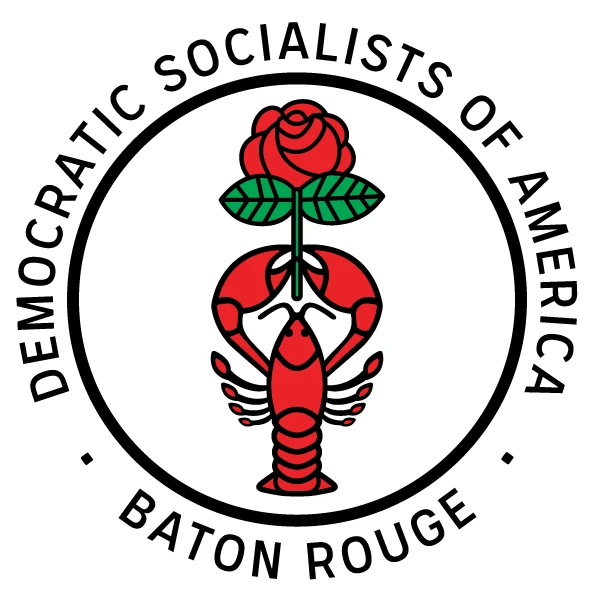

Imagine a World Without Political Violence
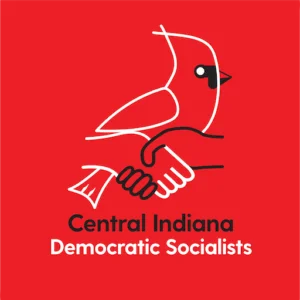
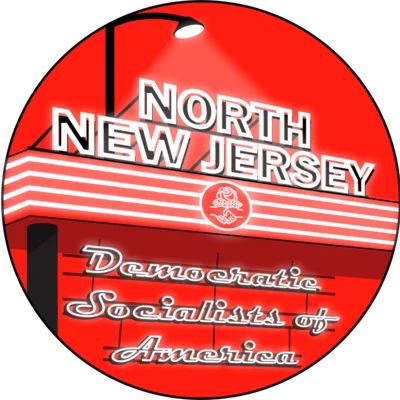


Get Up, Get Excited, Get Organized with MADSA!
After an action packed September General Meeting, two important shout-outs are in order:
First, we voted to kickstart a No Appetite for Apartheid Campaign here in Madison. No Appetite for Apartheid is a DSA National campaign launched by the Palestine Solidarity Working Group to pressure grocery stores to become Apartheid Free Stores by dropping companies and products that participate in Israeli apartheid and theft of Palestinian land. The campaign is powered by a number of chapters and coalitions across the country, and the Madison Area chapter will now be engaging in that work as well! As socialists, we stand in solidarity with all those facing settler-colonialism, and as Americans it is our duty to work from within the empire to end American imperialist violence around the world. At the September General Meeting, the chapter voted overwhelmingly to reaffirm this commitment by being the force for change in our own city. We look forward to an apartheid free Madison – and we need your help to get there. To get involved in this important work, join the #palestine-solidarity channel on Slack, check the chapter calendar for upcoming No Appetite for Apartheid (NA4A) planning meetings and events, and read more about the national campaign here.
Second, we voted to charter an Electoral Working Group to formalize the work already being done by the Power Mapping Committee as we prepare for local elections and work towards a statewide electoral strategy. If electoral work is your jam, you’ll definitely want to check out an upcoming EWG meeting, help canvas our neighborhoods with your MADSA comrades, and mark your calendars for the members-only town hall with Rep. Hong on September 29. Why a town hall with Rep. Hong? Well if you haven’t heard, Francesca Hong – a MADSA member and endorsed state legislator – is running for governor! We are excited to see where this campaign goes and to working with Fran on building the democratic socialist movement in Wisconsin. To that end, we must now engage in the process of democratically deciding if and how to get involved in the gubernatorial race. The town hall will be the first step in this process, where members will have the opportunity to ask Fran any and all questions – so don’t miss out! If you’re not yet a member, join DSA today to be able to attend.
If all that isn’t enough action for you, we have so many more exciting events and opportunities to get involved in our growing movement for a better city, state, country, and world, so get your calendars out and read on for all the details.
In this newsletter:
- Thu. September 25, 6-8:00pm: Beyond the Two Party System: A Socialist Way Forward
- Sat. September 27, 10:00am-12:00pm: Coffee with Comrades!
- Sun. September 28, 11:00am-12:30pm: Wretched of the Earth Reading Group
- Mon. September 29, 6:30pm: Members-Only Town Hall with Rep. Francesca Hong
- Sat. October 4, 2-3:30pm: October New Member Orientation
- Tue. October 7, 6:30pm: Copaganda Book Talk with Author Alec Karakatsanis
- Sun. October 12, 5-9:00pm: Halloween Carnival & Queer Liberation March Fundraiser
- Wed. October 15, 6:30-8:30pm: October General Membership Meeting


